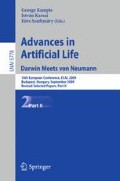Abstract
We introduce a model of the evolution of cooperation in groups which incorporates both conditional direct-reciprocity (“tit-for-tat”), and indirect-reciprocity based on public reputation (“conspicuous altruism”). We use ALife methods to quantitatively assess the effect of changing the group size and the frequency with which other group members are encountered. We find that for moderately sized groups, although conspicuous altruism plays an important role in enabling cooperation, it fails to prevent an exponential increase in the level of the defectors as the group size is increased, suggesting that economic factors may limit group size for cooperative ecological tasks such as foraging.
Access this chapter
Tax calculation will be finalised at checkout
Purchases are for personal use only
Preview
Unable to display preview. Download preview PDF.
References
Ficici, S.G., Pollack, J.B.: Challenges in coevolutionary learning: Arms-race dynamics, open-endedness, and mediocre stable states. In: Proceedings of of ALIFE-6 (1998)
Ficici, S.G., Pollack, J.B.: A game-theoretic approach to the simple coevolutionary algorithm. In: Schwefel, H.-P., Schoenauer, M., Deb, K., Rudolph, G., Yao, X., Lutton, E., Merelo, J.J. (eds.) PPSN VI 2000. LNCS, vol. 1917, pp. 16–20. Springer, Heidelberg (2000)
Hillis, W.D.: Co-evolving parasites improve simulated evolution as an optimization procedure. In: Langton, et al. (eds.) Proceedings of ALIFE-2, pp. 313–324. Addison Wesley, Reading (1992)
Miller, J.H.: The coevolution of automata in the repeated Prisoner’s Dilemma. Journal of Economic Behavior and Organization 29(1), 87–112 (1996)
Nowak, M.A., Sigmund, K.: The alternating prisoner’s dilemma. Journal of Theoretical Biology 168, 219–226 (1994)
Nowak, M.A., Sigmund, K.: The dynamics of indirect reciprocity. Journal of Theoretical Biology 194(4), 561–574 (1998)
Nowak, M.A., Sigmund, K.: Evolution of indirect reciprocity by image scoring. Nature 383, 537–577 (1998)
Shampine, L.F., Reichelt, M.W.: The MATLAB ODE suite (2009), http://www.mathworks.com/access/helpdesk/help/pdf_doc/otherdocs/ode_suite.pdf
Stafford, R.: Random vectors with fixed sum (January 2006), http://www.mathworks.com/matlabcentral/fileexchange/9700
Walsh, W.E., Das, R., Tesauro, G., Kephart, J.O.: Analyzing complex strategic interactions in multi-agent games. In: AAAI 2002 Workshop on Game Theoretic and Decision Theoretic Agents (2002), http://wewalsh.com/papers/MultiAgentGame.pdf
Weibull, J.W.: Evolutionary Game Theory. MIT Press, Cambridge (1997) (First MIT Press edition)
Wellman, M.P.: Methods for Empirical Game-Theoretic Analysis. In: Proceedings of the Twenty-First National Conference on Artificial Intelligence, pp. 1152–1155 (2006)
Author information
Authors and Affiliations
Editor information
Editors and Affiliations
Rights and permissions
Copyright information
© 2011 Springer-Verlag Berlin Heidelberg
About this paper
Cite this paper
Phelps, S., Nevarez, G., Howes, A. (2011). The Effect of Group Size and Frequency-of-Encounter on the Evolution of Cooperation. In: Kampis, G., Karsai, I., Szathmáry, E. (eds) Advances in Artificial Life. Darwin Meets von Neumann. ECAL 2009. Lecture Notes in Computer Science(), vol 5778. Springer, Berlin, Heidelberg. https://doi.org/10.1007/978-3-642-21314-4_5
Download citation
DOI: https://doi.org/10.1007/978-3-642-21314-4_5
Publisher Name: Springer, Berlin, Heidelberg
Print ISBN: 978-3-642-21313-7
Online ISBN: 978-3-642-21314-4
eBook Packages: Computer ScienceComputer Science (R0)

